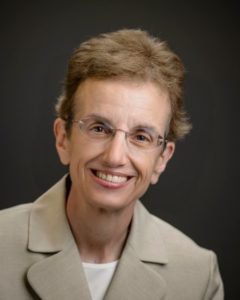
“Christianity as Planetary Faith”
A faculty reflection by guest teacher Ilia Delio

Let’s face it. Religion is not popular. It tastes like old coffee. It seems to confine or constrain the human spirit. Religion is something old people do. It does not breed adventure, novelty, exploration or future. It conjures up images of mortification, sin, guilt, judgment, repression—images that reflect a lonely Jesus dying on the cross.
The Omega Center conference on “Christianity as Planetary Faith” aims to debunk the myth of old religion. For one thing, old religion is a certain type of institutional religion, not necessarily related to the message of the Gospel. The Jesuit scientist Pierre Teilhard de Chardin was keenly aware of this problem. His deep devotion to the Sacred Heart of Jesus and his keen eye as a paleontologist led him to see the heart of God in the heart of matter. He devoted himself to bridging evolution and Christianity, to kindle the meaning of Christ and evolution and to construct a new religious myth of religion and evolution. His vision was, and is, revolutionary.
Teilhard held that religion is not about human sin and judgment; it is about cosmic evolution and its dynamic impulse to transcend toward more being and consciousness. He placed religion within a cosmological evolutionary framework. Religion emerges as species complexify, accompanied by a rise in consciousness and culture. Evolution, he maintained, is neither theory nor particular fact but a “dimension” to which all thinking in whatever area must conform. Evolution proceeds through the spheres of matter, life, and consciousness. This process requires a center, which is also its energizing goal. By this Teilhard meant that there is within evolution a centrating point of unfolding unity, which he called “Omega,” empowering evolution from within and yet transcendent to the process. From the perspective of Christian faith and Scripture, Omega is God, the personal source of creation who is deeply immersed in evolution and its goal.
To understand Teilhard’s vision is to appreciate that religion is not a human phenomenon but a cosmic phenomenon. If we are to progress or evolve, we must release ourselves from religious individualism and confront the general religious experience, which is cosmic and evolutionary, and involve ourselves in it. In other words, religion is concerned with The Whole of life—universe, galaxies, earth and other planets, humans and all forms of intelligent life.
Teilhard saw a particular role for Christianity because it is a religion of materiality. Everything from quarks and stars to chips and robots expresses divine love, a love constantly creating and incarnating unto higher levels of being in love. Jesus is the human person who responds to the offer of divine love by a full blown “yes,” thus exposing the openness of physical matter to God. In Jesus Christ, who is the divine Word incarnate, the potency that lies in matter to receive the very personal self-communication of God is realized.
Teilhard almost never spoke of the earthly life of Jesus, nor did he focus on Jesus’ works or ministry—and for good reason. Christianity has become a religion of “jesuolotry” and has lost sight of Christ who symbolizes divinity at the heart of The Whole. Raimon Panikkar, like Teilhard, realized that Christ is not a law or doctrine by which grace and virtue is possible. Christ is the life not only of human life or life in terrestrial creation but the life of the universe and all universes where there is intelligent life. Christ is the symbol of the whole of reality, the realization of God’s intention to love unto the fullness of love.
In Teilhard’s view, our thinking about God is too small, too narrow, too rote. As Meister Eckhart exclaimed, “I pray God to rid me of God!” The mystics know from the depths of their inner lives that the name God points to the ineffable mystery of incomprehensible love at the heart of all reality. If we think we know God, we haven’t a clue of what we are talking about. Religion is a technology of spiritual energies that harnesses the endless depth of consciousness toward the absolute horizon of God. The whole point of religion, from a Christian perspective, is new life and future—to become new being, an ever newness in love. This, too, is what we want to explore at our Omega conference.
It is time to get over our allergy to religion and awaken our minds and hearts to a new myth of religious evolution. Teilhard is our guide and teacher. His vision is bright and hopeful, and it is one that expands beyond the noosphere into the universe and universes of intergalactic life. Christophany means to awaken to the Whole within us, among us, and before us. We will not solve the problems of race, gender, inequality, and immigration by the present political, historical, and ecclesial structures. We need a new paradigm, a new myth, a new vitality for a new life. Our Omega Center conference will focus on bringing religion and evolution into a new understanding. As Living School alumni, you understand the spiritual imperative of evolving in love, and we invite you to consider joining us in July. These pillars have come apart in our age but now it is now up to us to bring about a new synthesis: a new religion for a new earth in a new way.
Learn more about the Omega Center’s conference, “Christianity as Planetary Faith,” July 20-21, 2018 at https://www.omegacenter.info/event/omega-conference-2018/.

